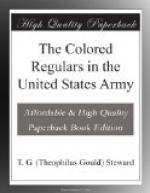When the cannon’s music thrills
To the hearts of those lone hills.
When the spear in conflict shakes,
And the strong lance shivering breaks.
* * * * *
“Take thy banner! and if
e’er
Thou should’st press the soldier’s
bier
And the muffled drum shall beat
To the tread of mournful feet,
Then the crimson flag shall be
Martial cloak and shroud for thee.”
The warrior took that banner proud,
And it was his martial cloak and shroud.
CHAPTER III.
The black regulars of the army of invasion in the Spanish-American war.
Organization of Negro
Regiments in the Regular Army—First
Move in the War—Chickamauga
and Tampa—Note.
Altogether the colored soldiers in the Civil War took part and sustained casualties in two hundred and fifty-one different engagements and came out of the prolonged conflict with their character so well established that up to the present hour they have been able to hold an important place in the Regular Army of the United States. No regiment of colored troops in the service was more renowned at the close of the war or has secured a more advantageous position in the history of that period than the Fifty-fourth Massachusetts Regiment of Infantry. Recruited among the free colored people of the North, many of them coming from Ohio, it was remarkable for the intelligence and character of its men, and for the high purpose and noble bearing of its officers. Being granted but half the pay per month given to white soldiers, the regiment to a man, for eighteen months refused to receive one cent from the Government. This was a spectacle that the country could not longer stand. One thousand volunteers fighting the country’s battles without any compensation rather than submit to a discrimination fatal to their manhood, aroused such a sentiment that Congress was compelled to put them on the pay-roll on equal footing with all other soldiers. By them the question of the black soldier’s pay and rations was settled in the Army of the United States for all time. Every soldier, indeed every man in the army, except the chaplain, now draws the pay of his grade without regard to color, hair or race. By the time these lines reach the public eye it is to be hoped that even the chaplain will be lifted from his exceptional position and given the pay belonging to his rank as captain.
(February 2, 1901, the bill became a law giving chaplains the full pay of their grade.)
More than 185,000 blacks, all told, served in the army of the Union during the War of the Rebellion, and the losses from their ranks of men killed in battle were as heavy as from the white troops. Their bravery was everywhere recognized, and in the short time in which they were employed, several rose to commissions.




